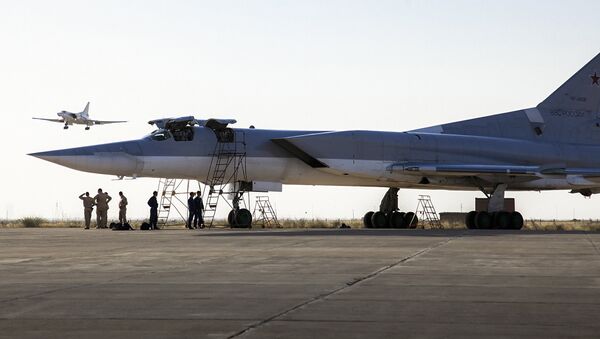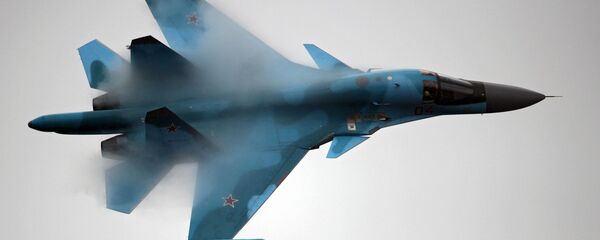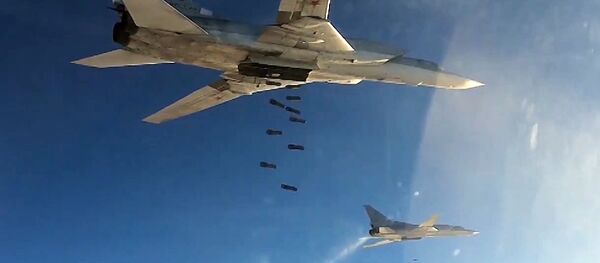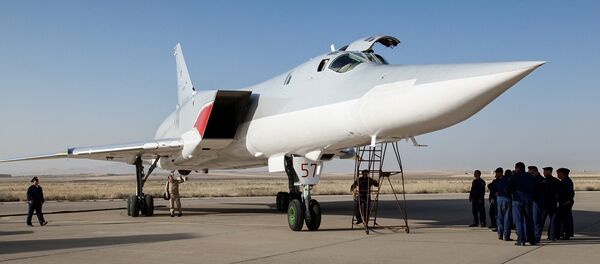Moscow has once again caught Washington by surprise by increasing the level of strategic military cooperation with Iran in Syria.
On August 15, Russia's Tupolev Tu-22M3 supersonic long-range strategic bombers and Sukhoi Su-34 jets were deployed at the Hamadan airfield in Iran as part of Russia's aerial campaign against Daesh (ISIS/ISIL) in Syria.
The next very day the Russian warplanes attacked terrorists' positions near the cities of Serakab, Al-Ghab, Aleppo and Deir ez-Zor.
"While American officials said they were not surprised by the Russia-Iran military collaboration, it appeared to catch them off guard, with no solid information on the Kremlin's intentions," The New York Times reported Tuesday.
Western pundits drew attention to the fact that it is the first time since 1979, that Iran has allowed a foreign power to carry out military operations from its soil.
"Not since the revolution in 1979 has Iran allowed a foreign power to conduct military operations from its territory. The presence of the bombers is a visible demonstration of the alliance between Russia and Iran," David Blair of the Telegraph stressed.
Indeed, in his Tuesday interview with state-run Islamic Republic News Agency (IRNA) Iran's Secretary of Supreme National Security Council Ali Shamkhani underscored that "Iran and Russia enjoy strategic cooperation in the fight against terrorism in Syria, and share their facilities and capacities to this end."
Head of the Center for Strategic Studies affiliated to the Expediency Council Ali Akbar Velayati echoed Shamkhani Wednesday, saying that "Iran and Russia enhanced level of cooperation in line with international campaign against terrorism," according to IRNA.
David Blair points out that as aresult of the recent developments Moscow's armed forces are now present in two Middle Eastern countries, while previously Russians "possessed nothing in the region aside from a small naval base in Syria."
"As the West has retreated from the region, Russia has surged ahead — including into Iran, a country that was viscerally unwilling to allow foreign forces on its soil," Blair highlights.
For its part, the Financial Times has voiced concerns that the deployment of Russian bombers in Iran has strengthened Moscow's position in the Middle East, "increasing pressure on the US to co-ordinate its Syrian military campaign with Russia."
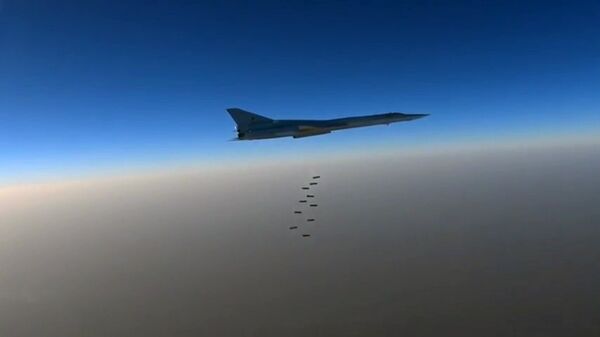
In his interview with RT political commentator John Wight emphasized that the Russo-Iranian partnership in Syria is "a model kind of military cooperation" the West lacks.
"This is a model of the kind of cooperation required to defeat this [terrorist] menace in Syria, and that is a kind of cooperation that is lacking in the West, when it comes to its efforts to fight this menace," Wight stressed referring to the West's unwillingness to team up with Moscow, Tehran and Damascus to combat Daesh.
Furthermore, in early July Turkish Foreign Minister Mevlut Cavusoglu hinted at the possibility that Ankara could permit Russia to use its Incirlik airfield, while in December 2015 the Greek Cypriot government came with a similar offer.
To amplify its discontent with Russia's growing influence in the Middle East, Washington announced Tuesday that it was looking into whether Moscow's move violates UN Security Council Resolution 2231, which prohibits the supply, sale and transfer of combat aircraft to Iran, according to Reuters.
In response Russian Foreign Minister Sergei Lavrov stressed that Moscow is by no means violating the Security Council resolution.
"According to this resolution, supplies, sale and transfer of certain types of weapons, including combat aircraft, should be agreed with the UNSC. In the case we are discussing, there were no supply, sale or transfer of combat jets to Iran. These jets are used by the Russian Aerospace Forces to conduct an anti-terrorist operation in the Syrian Arab Republic at the request of the legitimate Syrian leadership," Lavrov elaborated Wednesday.
